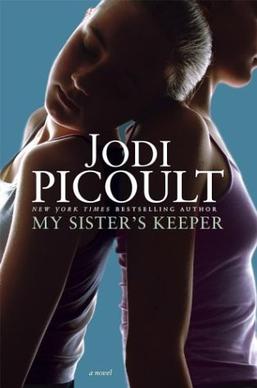In My Sister’s Keeper by Jodi Picoult (Washington Square Press, 2005), thirteen-year-old Anna sues her parents for bodily autonomy. Although she’s not sick, she’s had a dozen hospital stays and medical interventions throughout her life, all in the name of saving her older sister, Kate, who has leukemia. To complicate matters, her mother and father specifically genetically engineered Anna to have a perfect matching blood type in order to help Kate. Anna’s mother is determined to fight against Anna’s lawsuit in order to continue to help Kate stay alive.
As I read My Sister’s Keeper, I couldn’t stop thinking about it. My own children. One dying, the other able to save her but as a result repeatedly hospitalized and poked and prodded. The book deals with the ethics of genetic engineering as well as the ethics of using a child as a donor for blood and bone marrow when they are not of an age in which they can give informed consent.
Another strong theme is life and death. While the parents are consumed and busy with Anna and Kate, their older brother Jesse has slipped through the cracks. He’s an alcoholic pyromaniac at age 18, and there seems to be very little to help him find the right direction in life. One must also consider Kate’s quality of life, as well as Anna’s, since she, for example, finds she can’t do hockey when she’s repeatedly needed at the hospital as Kate’s donor. Is death that bad? As someone who believes in life beyond this one, I would find it difficult but I’d probably agree with Brian, Kate’s dad, who wanted to prepare for her death when she was 11, instead of prolonging her suffering at the hospital.
As a side story, Anna’s pro-bono lawyer, Campbell Alexander, happens to know the guardian ad litem (aka, the adult responsible to stand up for Anna’s needs during the court case). Julia and Campbell had been first loves in high school, and a sudden rupture means they haven’t had a conversation since high school graduation. Now, their paths cross and they must confront one another. Is having a relationship worth the life changes? The difficult conversations? I found this particular relationship and the history of their teenage affair to be a bit unsatisfying and distracting from the main story.
So what is most important? Quality of life? Life for all the children? The life of one particular child, or the comfort of all of them? Is it worth Anna risking the complications of a kidney transplant for her sister to live another year? What about only another 3 months? There is so much to consider. Picoult manages to craft a story full of loveable characters. The last few chapters provided two unique twists. One was both satisfying and made sense, while the second twist was heartbreaking and completely unnatural. We knew it was a story about cancer, but in some respects I feel like Picoult was trying to play with our emotions in the end of the book.
So, I recommend My Sister’s Keeper as an emotional book that will get you thinking about ethics, living, and death. The reader should just remember that it also has a bit of manipulation that leaves a slightly unsatisfactory feeling upon completion. It’s not a favorite book but I’m glad I read it.





